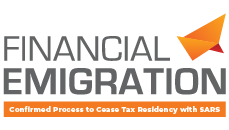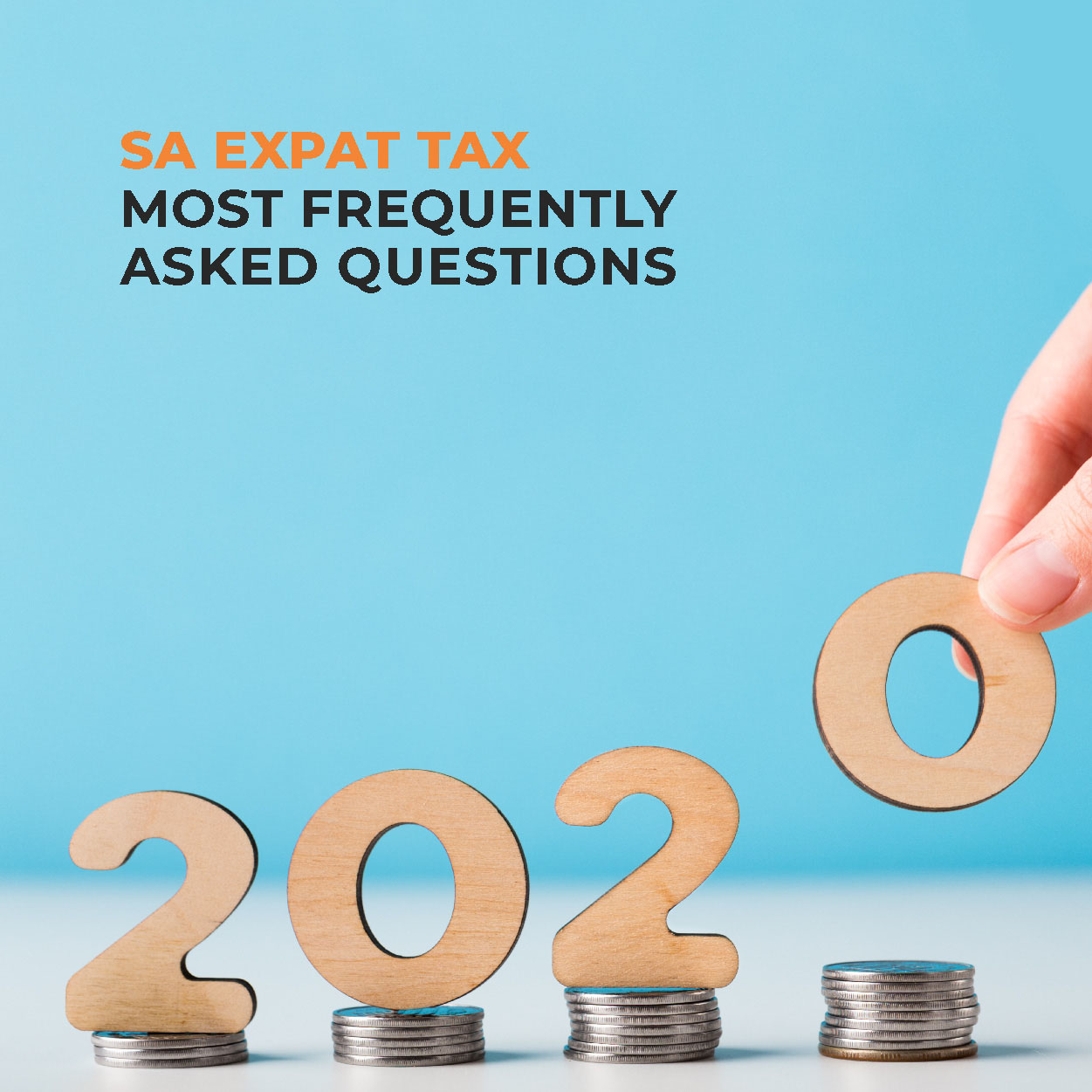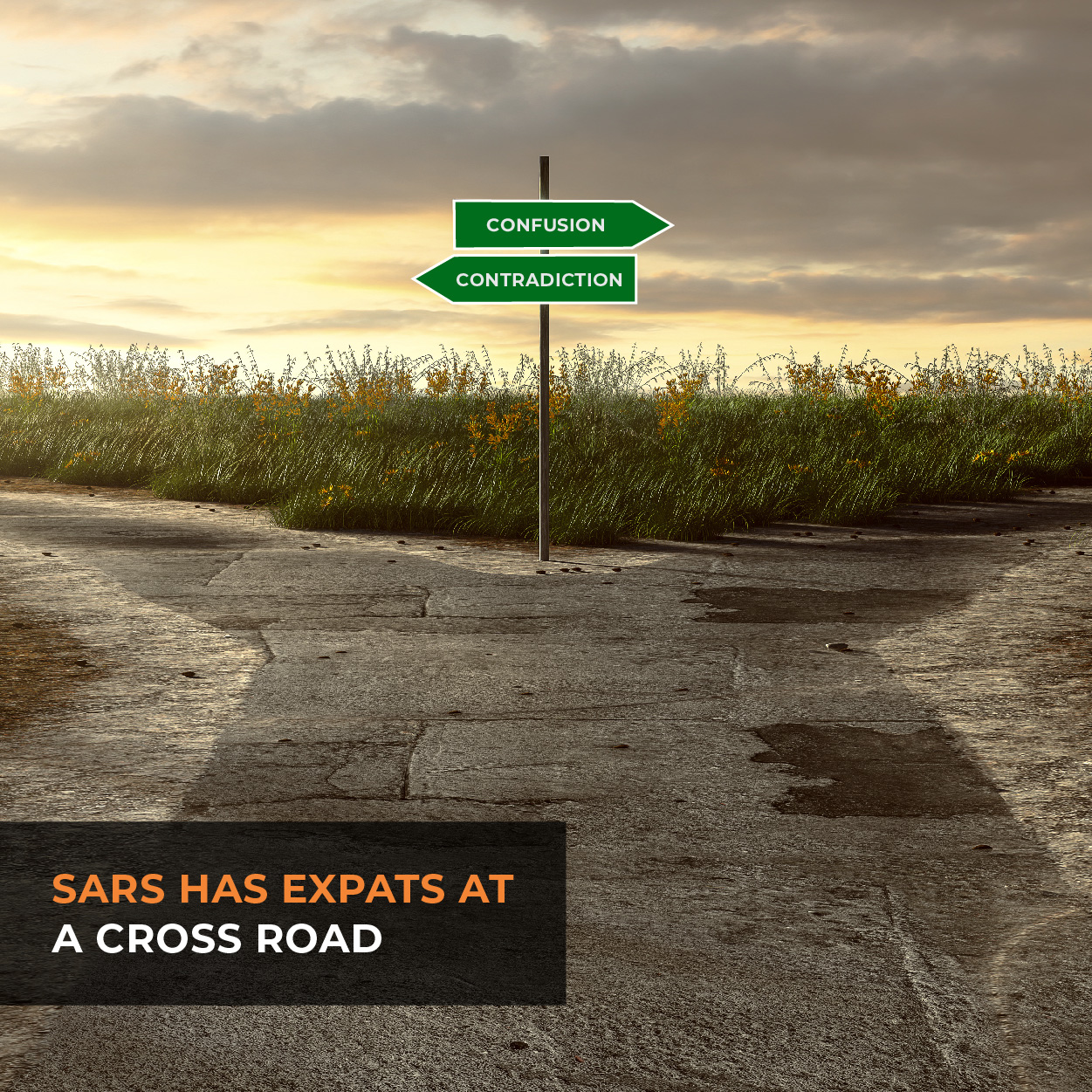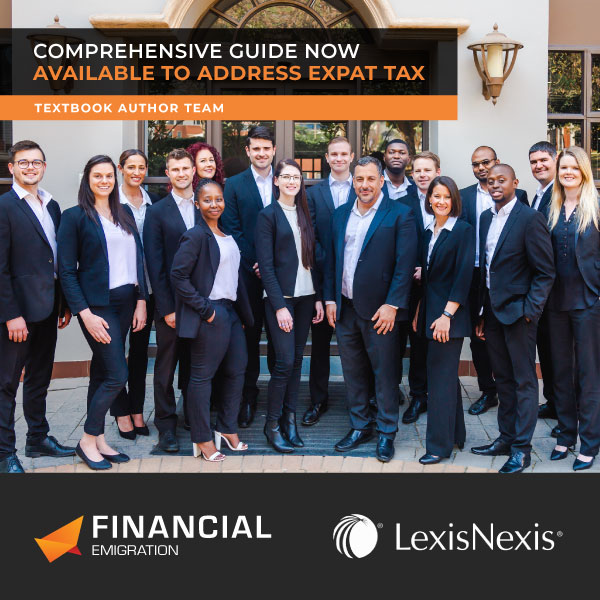SA EXPAT TAX
MOST FREQUENTLY ASKED QUESTIONS
As March 2020 approaches, when SA ‘Expat Tax’ is due to be implemented, we’ve been inundated with questions from South Africans working abroad. Here are some of the latest questions from SAPeople followers around the world, with answers kindly provided by the expert tax team at Tax Consulting South Africa.
- Legal Privilege, Confidentiality and Liability
When we operate in our practice, our advice comes with legal privilege (as admitted attorneys, which are the only tax advisors given such privilege under the Tax Administration Act), confidentiality as per our professional association rules (we are bound by the rules of various professional bodies including law society, SAICA, SAIBA, SAIPA, FSB (now FSCA), SAIT, FPI, SARA and SAPA etc.), and we also accept liability for our professional guidance where explicitly required by clients and stated as such. As this is general guidance given on limited facts, we note that these rules do not apply to the responses we provide. - Tax and Exchange Control Law
There are some fundamental rules of tax and exchange control, which applies to all South African residents or persons otherwise with a South African source of income. No response is proper where these rules are not referenced. Hence, we noted below some of the most general items applicable to all questions, thus avoiding repetition and ensuring everyone has access to the same tax technical information:
-
- Before one can decide on how to proceed, one needs to determine if they are a tax resident of South Africa by applying our two tax residency tests, being the Ordinarily Resident test and the Physical Presence test. You can also be non-resident somewhere else, but this is more complex process and will need specific guidance on a case-by-case basis.
- If one is a tax resident of South Africa, then they will be liable for tax on their worldwide income and the amended expat exemption will apply. If one is a non-tax resident of South Africa, they will be taxable only on South African sourced income. Thus, it is imperative that these tests are applied correctly, and a determination is made.
Both of the above-mentioned tests are set out in the links below for your ease of reference:
2.1 Ordinarily resident test – click here
2.2 Physical presence test – click here
We have also set out further information below, which will assist in understanding the pros and cons of the solutions you have in regard to tax residency and the amended expat exemption.
Expat tax compliance brochure: click here
Article on Expat tax law: Changes to law for South Africans working abroad
We will refer to these sources in each response and please just let us know if you need more personalised attention. There is always someone willing to have a call with you to assist and there are no hidden cost implications. Also, we really enjoy unique situations and/or high net worth cases, where the answer and optimally compliant position are more complex.
For more information, please contact Claudia Apicella, Head of Expatriate Tax Compliance at claudia@taxconsulting.co.za.
Frequently Asked Questions (FAQ) about South Africa’s ‘Expat Tax’
Please click on the plus sign to view the question and answer from each individual.
1. RETIRED OVERSEAS WITH DUAL NATIONALITY.
Question:
I have been resident in the UK since 1980 and have been a UK tax payer since that time. I never formally immigrated when I left SA in 1980. I am now 66 years old and retired in the UK. I am also drawing a pension here. My wife and I own a property in Cape Town and we use it 4 or 5 months a year to escape the Northern Winter (Swallows). We both have bank accounts with FNB – my wife’s being a non-resident account (she is British) and mine is classed as resident. I have dual nationality and a SA ID card. I use the account to cover expenses related to the property as well as some of our living expenses when we are down there so I regularly send remit funds to the account. I believe that I soon may be liable for tax in SA although I believe that this may only affect those earning over R1million. How do I go about formally immigrating for tax purposes and should I do that if I am earning below R1m?
Answer:
Dear Jon
Please see our initial introduction page for information on financial emigration, the dual taxation agreement as well as our two tax residency tests.
- The section 10(1)(o)(ii) amendment, introducing the R1 million threshold, is applicable to all South African tax residents who earn foreign employment income. If you are not earning foreign employment income the R1 million exemption would not impact your circumstances.
- However, if you are receiving other forms of income abroad (pension), this may be subject to tax in SA and will need to be investigated in order to determine any potential liability.
- Should you, however, not meet the SA residency tests the simplest; most compliant and factual route forward would be to formalise your non-tax residency through the financial emigration process, thereby mitigating your risk and liability around your worldwide income.
2. AN SA RESIDENT ON ASSIGNMENT ABROAD.
Question:
I am a SA resident living and working in Istanbul, Turkey. I have been here for 11 months and on a 3 year assignment with my company. Our company has an agreement with the Turkish government that all expats need to work for the registered Liaison office and are therefore exempt from paying tax. This is beneficial to the country that expat can bring expertise into the market for a limited time and also for companies who can then afford to give expats housing and company cars for this 3 year period. If expats where taxed in Turkey it would not be affordable to have the expats in the country. The only catch then is that all expats salaries are based on their net home country salaries. The new SA expat tax law will now result in me having to pay tax on my total benefits salary off my SA net salary equivalent salary which will have devastating results for me and will not be affordable. We are paid locally in Turkish Lira and prior to arriving in Turkey the Lira experienced devaluation from which it has not recovered so on top of the tax off a net SA equivalent salary base the constant Fx fluctuations also impact significantly. My company will not compensate for the Fx fluctuations as well as the SA Expat taxes and as a result I may need to return to SA in Feb 2020 – without a job as I cannot afford to earn a net income and then still be expected to pay up to 45% of that income in tax in SA. I will effectively be working for food and clothing which is not sustainable. I moved here to secure my job and income and now this is all at risk and I may become unemployed as a result. Can you advise if there are any options to secure my net income without having to give up citizenship as well as 18% capital gains tax for financial emigration.
Answer:
Dear Stephen
Please see our initial introduction page for information on financial emigration, the dual taxation agreement as well as our two tax residency tests.
- The options available to you are all dependant on what your intention is in terms of returning to South Africa. Should your intention be that you will permanently be residing outside of South Africa, then you may consider Financial Emigration.
- However, where your intention is to work and reside outside of South Africa for a short term, i.e. 3 years, then you may wish to consider making use of the Double Tax Agreement between South Africa and Turkey.
- When you financially emigrate or make use of the DTA, you cease tax residency. Ceasing tax residency triggers a deemed disposal, on local and global assets, which in certain circumstances will lead to a CGT (Capital Gains Taxes) liability. Please note that CGT is not calculated at a 18% flat rate. This is a more complex calculation and the gain determined will be included in your taxable income. Your taxable income will then determine which tax bracket it falls under for the year.
3. LEFT SA DECADES AGO WITHOUT EVER OFFICIALLY EMIGRATING.
Question:
I grew up in SA and worked in the country in the ’80s (paying tax). I then left in 1990 and have since lived in the UK and Australia (where I’ve also paid tax). I don’t have a bank account in SA or any retirement or any property. I’ve only been back to SA on holiday since leaving. Does this expat tax affect me at all?
Answer:
Please see our initial introduction page for information on financial emigration, the dual taxation agreement as well as our two tax residency tests.
- For so long as you are deemed a tax resident of South Africa, you will be required to declare your worldwide income. South Africa’s tax residency is determined by way of the “ordinarily resident test” and the “physical presence test”.
- Based on the information above and on face value, there does not appear to be much risk as there is a low claim or evidence that you are a South African tax resident due to the period of time that you have spent living outside of South Africa and the fact that you have no remaining assets in South Africa.
- However, as you lived in SA for a period that would qualify you as tax resident the safest route would be for you to formally cease tax residency in SA to ensure you are fully covered and risk is mitigated. This is best done through the financial emigration process.
4. LIVING ABROAD WITH BANK ACCOUNTS IN SA.
Question:
Me and my wife are living in the US since 1 January 2016. We have sold all our assets and paid a horrendous amount of tax and other charges to have our money transferred to the US. We both still have a bank account in SA for the time we might return to SA. My wife is working and I am not because of my cancer treatment which is not affordable in SA. If I was in SA I would not have been sending this e-mail because I surely would not have been alive by now. How will we know if we need to pay the new tax? If we need to pay this tax I will unfortunately have to stop my treatment as the treatment is not fully covered by the medical aid. My questions are: (i) How do we know if we need to pay the tax? (ii) If we do what will be the best way to stop this?
Answer:
Dear Johan
Please see our initial introduction page for information on financial emigration, the dual taxation agreement as well as our two tax residency tests.
- For starters, you will be required to declare your worldwide income to SARS where you are a tax resident of South Africa. South Africa’s tax residency is determined by way of the “ordinarily resident test” and the “physical presence test”.
- Based on your circumstances, it would appear as though you are not tax resident considering the period of time that you have spent outside of South Africa and the fact that you do not hold any assets in South Africa.
- Nevertheless, as you lived in SA for a period that would qualify you as tax resident the safest route would be for you to formally cease tax residency in SA to ensure you are fully covered and risk is mitigated.
- Where your intention is to permanently remain outside of South Africa, the best route to cease your tax residency is through the financial emigration process. However, where your intention is stay outside of South Africa for a short term, then you may wish to consider making use of the Double Tax Agreement.
5. LIVING ABROAD AS PERMANENT RESIDENT OF SA BUT NOT A CITIZEN.
Question:
I had Rhodesian passports since 1953 and changed when in the UK with a Rhodesia House working father. I have had UK resident passports since 1968. I returned to Rhodesia in 1968 and moved to SA in 1971, leaving to retire in the UK in 2004. I have permanent residence in SA. I have small pensions and annuities from working years in SA, totalling about R18000 per month. I left informally, my circumstances not being financially strong. I have no more assets in SA other than the funds providing for my retirement. I am obviously non resident for tax purposes, but on advice I left this as if still resident and am still taxed in SA as well as UK. The double tax agreement makes quite clear that the UK are entitled to their tax. What concerns me most is that it is complex to change this regime and there seems little point in formal emigration. I am especially concerned that any approach may take me into the realm of notional capital gains tax on assets acquired over 15 years here, which in small measure compensate for my pension being paid in for 25 years at an exchange value of 50 UK pence and now coming through at 5 pence. What we have here is vital for existence and I do not wish to be involved in SA capital gains notions. I am not an SA citizen. Please advise.
Answer:
Dear Laurence
Please see our initial introduction page for information on financial emigration, the dual taxation agreement as well as our two tax residency tests.
- Making use of the DTA and financial emigration are two separate processes. Financial emigration is used where your intention is to permanently remain outside of South Africa. On the other hand, the DTA is selected as an option where your intention is stay outside of South Africa for a short period of time.
- Ceasing tax residency is seen as a deemed disposal event for the purpose of CGT. The deemed disposal rule, states that the taxpayer must be treated as having disposed of their assets and immediately reacquire the same assets at market value.
- Deemed disposal is applicable to all assets that you held immediately before you ceased your tax residency. However, it is not applicable to any immovable property situated in South Africa at the time the taxpayer ceases to be a resident.
- Where financial emigration is chosen and is applicable for you as a route to cease tax residency, you have the benefit of backdating your financial emigration to the date when you left South Africa. This means that any assets that you acquired subsequent to that date will not be the subject of the deemed disposal.
6. CGT AND FINANCIAL EMIGRATION.
Question:
I have moved to Canada on a permanent basis some 18 months ago. I have several questions but there two main ones: I am 70 yrs. old and have a “Living Annuity” with Coronation. Currently I can and do draw 17,5% pa from this. Now if I financially emigrate, can I get hold of the full balance which is around R2,7mil, or will this be subject to some form of exit tax? I have no other declarable income either in SA or Canada as I live off my share portfolio which is in US $ and has been taken out of SA via the DA annually over the last 5 years. I obviously have declared the Coronation annual payment each year. On the issue of the CGT on assets. Because my assets apart from the RA, are in shares, it is critical to choose a date when the markets were down in order to make the CGT as low as possible. Now I can argue with documentation, that we only really decided to stay in Canada once several factors had been met – i.e. signing a long term rental , getting permanent job for wife after probation period etc. The best date would be 8 months after we left SA – is this possible to specify a date as to when we effectively financially emigrated? I am sure a letter confirming end of probation could be arranged although it may be a bit of a push. The other alternative is the day we actually flew out. Also gives a not so bad CGT number of around US$20,000. As a final note, what would an estimate be to manage a FE on my and my wife’s behalf ? Basically have limited assets in SA, me – RA and cheque account which I would need to maintain for the kid’s stuff (they are both out of the country permanently) , wife 3 cheque accounts (mostly dormant) has a small investment in Coronation, small shares in JSE (would sell), a cell account we would need to keep for the kids local banks dealings (OTP’s), and that’s about it. The big issue is the CGT.
Answer:
Dear Colin
Please see our initial introduction page for information on financial emigration, the dual taxation agreement as well as our two tax residency tests.
- For starters, whether you elect to financially emigrate or not, you will not be able to withdraw the full balance of the living annuity. Therefore, you will have to continue to receive your living annuity at the current rate of 17.5%.
- Secondly, it is possible to backdate your financial emigration to the date when you left South Africa or to the date when you had the intention to permanently reside outside of South Africa.
- Deemed disposal is applicable to all assets that you held immediately before you ceased your tax residency. However, it is not applicable to any immovable property situated in South Africa at the time the taxpayer ceases to be a resident.
- Please be aware, however, that CGT looks at the base cost of the assets when you purchased them and the market value of the assets at the time that you cease tax residency. Therefore, if you purchased your shares before you left South Africa, backdating your financial emigration to a date when the markets were down will not assist in reducing your CGT.
- The cost of financial emigration ranges between R18,000.00 – R25,000.00 and is dependent on whether it is a single or family application and whether the financial emigration will be backdated or current. In terms of bank accounts, you will only be allowed to hold bank accounts with one banking institution, and thus will need to close others if you have any.
- With financial emigration your banking changes to non-resident banking and with this comes certain limitations to your account. You will however still be able to have debit orders on your account like normal.
7. YOUNG FAMILY IN THE UAE.
Question:
I found some informative questions and answers on your page but I’m still a little confused. I’m hoping for some clarity. My wife and I and our new-born live in the UAE. Have lived here since June 2014. We barely visit family in SA once every year or two for a couple of days. We still have both my wife and I bank accounts in SA that we primarily use to pay off a loan and a funeral plan. My salary is overt the tax bracket. How does this law effect my wife and I? What do we do in terms of the tax law?
Answer:
Dear Matthew
Please see our initial introduction page for information on financial emigration, the dual taxation agreement as well as our two tax residency tests.
- Firstly, you will be required to declare your worldwide income to SARS where you are a tax resident of South Africa. South Africa’s tax residency is determined by way of the “ordinarily resident test” and the “physical presence test”.
- As you may be aware, currently, as a South African earning foreign income and working in a foreign country, all your foreign income is exempt from tax if you meet the exemption requirements. However, from March 2020, only the first R1 million will be exempt from tax and any income above the R1 million threshold will be subject to tax.
- For so long as you and your wife have not ceased your tax residency, you are still required to declare your worldwide income and must then claim the exemption in respect of any income earned as a result of foreign employment.
- Where your intention is to permanently remain outside of South Africa, the best route to cease your tax residency is through the financial emigration process. However, where your intention is stay outside of South Africa for a short term, then you may wish to consider making use of the Double Tax Agreement.
Source: SA people news




